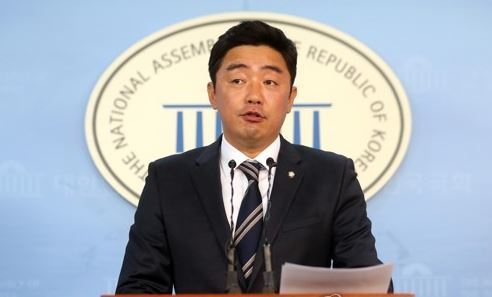The ruling Democratic Party called Saturday for bipartisan cooperation in coping with North Korean provocations, as the opposition bloc intensified its offensive against the government's "dovish" policy towards the communist state.
The call came shortly after Pyongyang's state media confirmed that it fired off a Hwasong-12 intermediate-range ballistic missile Friday while reaffirming that the North will not back down in the face of international sanctions and pressure.
The North's latest provocation drew sharp international condemnation. It followed the adoption this week of a new UN Security Council sanctions resolution to punish the North's sixth and most powerful nuclear test on Sept 3.
"Rather than seeking to politically use the security crisis, the opposition parties should join hands with the ruling party and pursue bipartisan cooperation," party spokesman Kang Hoon-sik told reporters.
 |
This photo, taken on June 5, 2017, shows Kang Hoon-sik, the spokesman for the ruling Democratic Party, speaking during a press conference at the National Assembly in Seoul. (Yonhap) |
Kang also rebuffed opposition calls for Seoul to explore tit-for-tat nuclear options such as the redeployment of US tactical nukes that were withdrawn from the Korean Peninsula in the early 1990s.
"The logic that nukes can be countered with nukes would have the peninsula face a greater danger, and give greater concerns to the citizens," he said. "If the political circles exploit national security based on partisan politics, this would trigger searing public criticism."
Amid the North's unceasing provocations, the main opposition Liberty Korea Party (LKP) raised pressure on the liberal administration to alter its North Korea policy that seeks to address the nuclear standoff through a delicate mixture of dialogue and sanctions.
It, in particular, demanded the government weigh the reintroduction of tactical nukes to the peninsula, as it argues Seoul must secure a "nuclear balance of power" with Pyongyang that it says now enjoys a "nuclear monopoly."
In a Thursday interview with US cable news network CNN, President Moon Jae-in ruled out any nuclear weapon option, warning it could destabilize Northeast Asia and trigger a regional arms race.
Meanwhile, opposition parties upbraided the government for considering humanitarian aid to the North despite tensions heightened by the North's persistent provocations.
Seoul is mulling offering $8 million in aid for infants and pregnant women in the North via U.N. agencies in a move to separate humanitarian activity from political considerations. Critics argue such assistance would undermine global efforts to address the nuclear standoff.
"Despite the missile provocation, the government says its position to provide aid to the North remains unchanged," Jeon Ji-myeong, the spokesman of the minor opposition Bareun Party, said in his commentary. "This would face serious resistance from both home and abroad."
The presidential office and government did not budge, saying it would still review the aid provision. (Yonhap)








